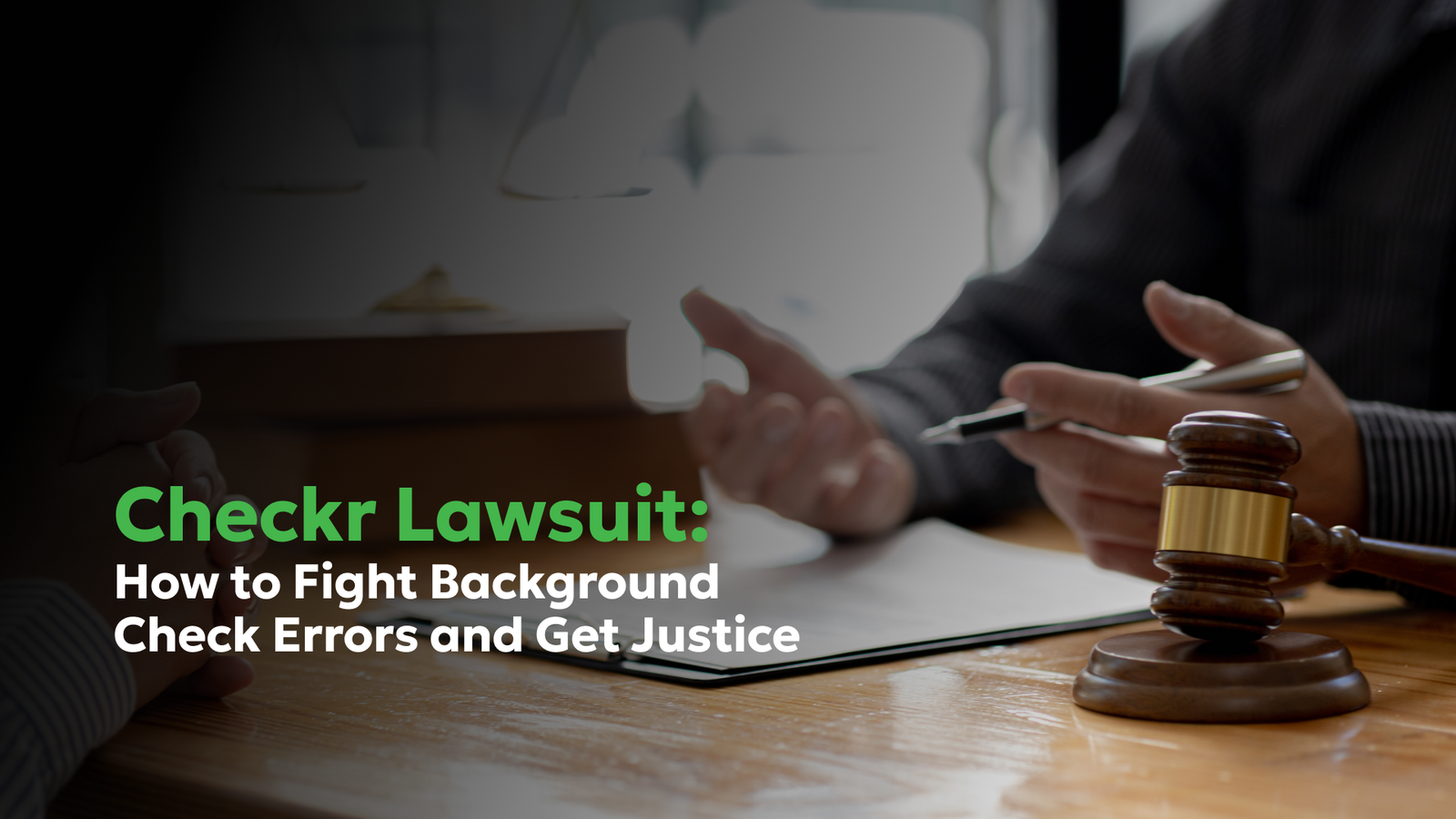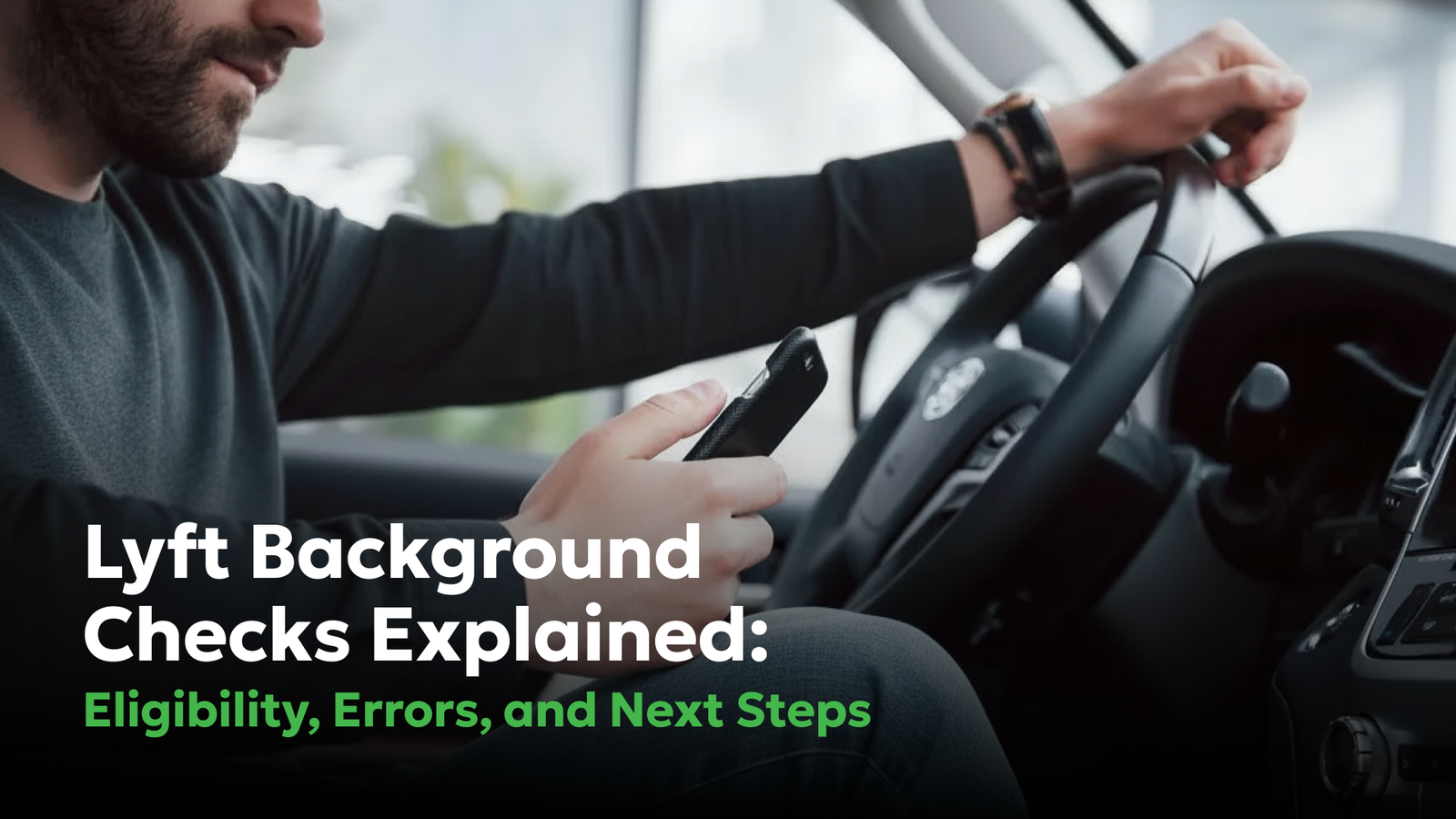What is a DOT Background Check?
- Blog
- Employment Background Check Errors
What is a DOT Background Check?

Complete Guide to DOT Background Checks, with Info on Who Needs One, What’s Involved, and What to Do When It Goes Wrong.
The U.S. Department of Transportation (DOT) requires employers to adhere to Federal Motor Carrier Safety Administration (FMCSA) standards for certain commercial drivers (CDLs), including running DOT background checks. These regulations, meant to boost safety, can harm good drivers when errors get reported. We explain it all and what to do next.
A Department of Transportation (DOT) background check is a pre-employment background screening required by the Federal Motor Carrier Safety Administration (FMCSA) for job applicants who drive commercial vehicles during the course of employment. It strives to maximize road safety by weeding out job candidates with questionable or challenging driver safety records.
Since the information returned in a DOT background check report can cause someone to lose out on job opportunities, it is absolutely critical that the information is accurate. In fact, it is also legally required that the information be accurate. This is because errors in these reports can result in a good driver with a safe driving record being unfairly disqualified as a job candidate. Not surprisingly, losing out on a job because a background check company got your details wrong is financially and emotionally devastating.
As background check lawyers at Consumer Attorneys, America’s largest consumer reporting law firm, we know that these errors happen all the time. But we also know that when they do, there is something you can do about it. There is a process for correcting your data and clearing your name, and we have a top-tier legal team ready to answer your questions and help you move through that process. We’ve helped thousands of clients recover from these types of errors, and we can help you, too.
So still wondering, “What is a DOT background check?” Keep reading to learn everything you need to know!
Who Has to Get a DOT Background Check?
If you are required to obtain and maintain a commercial driver's license (CDL) to get a specific job, then you have to get a DOT background check during the hiring process and at certain points throughout your employment.
What are commercial vehicles?
Commercial vehicles cover a broad range of vehicle types that can be used to carry cargo or passengers. They are much larger than a standard passenger vehicle. For instance, a standard car typically carries five to seven passengers, and a commercial passenger vehicle transports 15 or more (think of an airport shuttle or a bus). Commercial vehicles also weigh over 10,000 lbs. By comparison, an average car is about 4,000 lbs. A tractor-trailer is a great example of a commercial cargo vehicle.
What is the DOT and the FMCSA?
The Federal Motor Carrier Safety Administration (FMCSA) is an agency under the Department of Transportation (DOT) that is devoted to regulating all aspects of transportation in every form throughout the United States, including highway travel, aviation, railroad travel, pipeline safety, and maritime travel. The DOT established the FMCSA to specifically target the goal of lowering fatalities from accidents involving commercial vehicles.
To improve safety, the FMCSA requires commercial vehicle drivers to undergo more stringent exams, including advanced training, licensing exams, physical exams, and DOT background checks, prior to being hired by any particular employer.
Who Performs a DOT Background Check?
Though employers are required to conduct DOT background checks prior to hiring candidates for positions involving the operation of commercial vehicles, the actual background check can be performed by the employer or by a background check company.
A DOT background check, like any background check, is a consumer report that gathers available data and information about a person and compiles it into a streamlined report. This report is then used by prospective employers to determine whether an applicant is suitable for a job. Since the gathering and compiling of information can be cumbersome, time-consuming, and complicated, most employers opt to contract with third-party background check companies to perform these screenings.
What is a background check company?
A background check company is a for-profit consumer reporting agency (CRA) that operates in the consumer data industry, buying and selling data. Other examples of CRAs are credit bureaus. These companies use vast networks and algorithms to quickly scan databases and pull from third-party resources to build a targeted profile on a particular person. For instance, for a DOT background check, the data that is scanned, gathered and reported is targeted to the specific requirements for screening commercial vehicle drivers. (See below for the requirements.)
What Are the DOT Background Check Requirements?
Dot background check requirements cover a broad range of categories of information meant to provide a comprehensive profile of a commercial driver so that a prospective employer can assess the likelihood of that driver meeting and maintaining high safety standards while operating a vehicle. Let’s take a look.
What does a dot background check consist of?
A DOT background check consists of an assortment of historical and current variables used to compile a complete driver safety profile on a candidate, including the following:
| DOT Background Check Requirement | Description |
|---|---|
| Driving History/Record | This examines a candidate’s standard and CDL driving history for the three years prior to the date of the application. It includes information from any state in which the driver held a CDL during that three-year period, and it covers any and all driving-related events or violations, such as accidents, tickets, misdemeanors/felonies (such as DUI), etc. |
| Road Driving Test | The prospective employer must give this test to a candidate during the application process. To pass, the candidate must successfully operate the actual vehicle that will be required to carry out the functions of the job. |
| Employment Verification | This requirement examines a candidate’s employment history for the three years prior to the date of the application. It includes information from any employer during that three-year period, and it covers confirmation of work history, job assignments, responsibilities, types of vehicles operated, and safety records. |
| Drug and Alcohol Tests | This screening is conducted both pre-employment and periodically during random intervals throughout each year of employment. The FMCSA specifically requires testing for Marijuana, Cocaine, Opiates (opium and codeine derivatives), Amphetamines and methamphetamines, and PCP (Phencyclidine). Alcohol testing is optional, though many employers use random alcohol screenings to enhance safety. In addition, the FMCSA operates a Drug & Alcohol Clearinghouse, which is a database of information related to any prior reported violations of FMCSA’s substance-related policies and requirements. Employers search this database as well. |
| Physical Exam | The FMSCA requires that all CDL drivers “obtain and maintain a valid Medical Examiner’s Certificate (ME Certificate).” These certificates can only be obtained from practitioners who are listed on the National Registry of Certified Medical Examiners. The ME Certificate process also requires drivers to self-certify within a certain category, so the ME Certificate only covers the operation of vehicles within each category, which has to do with whether you are engaged in interstate or intrastate travel. Failing to meet the physical requirements or operating a vehicle outside of your self-certified category can result in the loss or suspension of your CDL. According to Concentra, a leading occupational medicine provider, the DOT background check physical exam includes a comprehensive assessment of vision and eye health, hearing and ear health, heart health (including blood pressure, pulse, murmurs, pacemakers, etc.), lungs and breathing health, mouth and throat health, vascular health, abdominal health, genito-urinary health (including a urinalysis), extremity health, musculoskeletal health (including spine), and neurological health (including speech, reflexes, etc.). Certain medical conditions or physical limitations require additional screenings. |
| Criminal History | While the FMCSA recommends a criminal history screening as part of a comprehensive candidate review, it is not currently required for a DOT background check. However, it is worth noting that many employers do opt to include this screening, which gathers comprehensive records regarding arrests, charges, degree (misdemeanor/felony), disposition, parole, sex offender registry, etc. |
Does a failed DOT drug test show up on a background check?
Whether a failed DOT drug test shows up on a background check depends on the type of position and the type of background screening to which candidates are subject. Specifically, if you are applying for a DOT-regulated position as a CDL, your prior failed drug testing will show up in the FMSCA Drug & Alcohol Clearinghouse for five years. However, if you are applying for any other position or screening that is not regulated by the DOT or subject to FMSCA requirements, your failed DOT drug test will not show up in the background check report. There may be exceptions to this rule for situations involving heightened screenings (such as high-level security clearances), but for the most part, this holds true.
How long does a DOT background check take?
A DOT background check typically takes one to five days, depending on the background check company used, the number of states a driver is licensed in, whether a driver has a very common name, and other variables that can impact the length of time.
What Happens if There Are Errors in Your DOT Background Check
If there are errors in your DOT background check, you can be rejected for a specific job, position, or opportunity.
Whether you get denied a job largely depends on the type of error that gets reported. For instance, if your address is reported incorrectly, this type of minor personal information can likely be corrected simply by providing your prospective employer with a current lease, deed, or utility bill. However, if any of the required categories of information (driving history, drug testing, prior employment record, etc.) get reported incorrectly, you will likely be rejected from the opportunity.
This is because DOT regulation of CDL positions through enforcement of the FMCSA requirements is a legal obligation. Failing to adhere to the hiring conditions for CDL drivers can result in public safety disasters and tremendous liability risks for the employer.
How common are mistakes in DOT background checks?
Mistakes in consumer reports are very common, with many research-backed estimates putting the number of consumer data mistakes at just over one-third. This means that approximately 33% of people will have inaccurate, misleading, or false data included in a consumer report during their lifetime. Unfortunately, DOT background check reports are no exception.
What to Do if There Are Mistakes in Your DOT Background Check
If there are mistakes in your DOT background check report, you will need to dispute them. These screenings, like all consumer reports, are regulated under the Fair Credit Reporting Act (FCRA). Even though “credit” is in the name, this important federal law governs the gathering and reporting of data in background checks as well. The FCRA empowers you with specific legal rights regarding your background check, such as:
- The Right to an Accurate Report. Mistakes of any kind, even seemingly minor details about prior addresses or similar, do not meet the legal standard required for background screenings under the FCRA, and you have a right to challenge and correct those mistakes.
- The Right to Review Your Report. If you don’t automatically receive one, you have the right to request and review your background report from the company that produced it.
- The Right to Know Which Info Mattered. You have the right to know which specific information in your background check report was used by the employer to deny you a job or fire you from an existing job.
- The Right to Dispute. The entity that ran the report on you must provide procedures for disputing the data. Most background check companies have options for filing a dispute online or via mail. Check the company website for details. (Note: filing a dispute online can waive your right to sue, which we recommend preserving by filing a dispute via certified mail.) If your prospective employer ran the report, they will have to advise you of their specific dispute procedure, but they will still have to adhere to all of the FCRA legal obligations imposed on them. Once a dispute is filed, the company generally has 30 days to investigate, respond, and correct any errors.
- The Right to Corrections. You have the right to have inaccuracies, including misleading or false information, corrected.
- The Right to Work with an Attorney. If your data is not adequately and timely corrected (which unfortunately happens all the time), you have the right to work with consumer protection attorneys to pursue a lawsuit. The FCRA makes the companies you sue pay for your legal costs and fees if you settle or win, so you pay nothing out of pocket. (And at Consumer Attorneys, if you don’t settle or win, you pay nothing!)
- The Right to Compensation. You have the right to pursue compensation for any financial, emotional, reputational, or other harm that you suffer as a result of the bad background reporting.
What to Do if Your Trucker Account is Deactivated
If your trucker account is deactivated, you need to follow the steps outlined by your company to reactivate it, and if that fails, you may need to enlist the help of an attorney.
A “trucker account” loosely refers to an account that a CDL professional uses within a given company. For instance, an Amazon driver or a UPS driver will have accounts within their company that are used to assign routes/deliveries and communicate about issues, etc. These internal accounts can be deactivated for various infractions or for failed background checks.
If your trucker account is deactivated due to violations of policy and procedures, whether or not your account is reactivated is up to the company.
If your trucker account is deactivated because a routine background check reported accurate information that violates company standards for CDL truckers, whether or not your account is reactivated is up to the company.
If your trucker account is deactivated because a routing background check reported inaccurate, misleading, or false information that incorrectly makes it appear that you violated company standards for CDL truckers, you should do the following:
- Let your company know. Inform your supervisor, HR professional, or similar that you’ve been deactivated based on false information in a background screening. Let them know you are filing a dispute with the background check company. You will likely have to provide a supporting statement and documentation. You can request reinstatement of your account pending the dispute process, but it is up to your employer whether to agree to this. They have no legal obligation to do so, and for liability reasons, they may not.
- Dispute the incorrect info. Follow the steps outlined above for disputing the information in the background report.
Request reactivation. Once the dispute process is resolved, whether it is resolved easily within 30 days or you had to file a lawsuit, you can submit the corrected background report to the employer and request reactivation of your trucker account or reinstatement of your job. Unfortunately, even at this phase, your employer is not obligated to rehire you or reactivate your account.
Frequently Asked Questions
A driver’s certification of violations was a form that truckers were required to fill out and submit to their employers annually, declaring any driving-related incidents they were involved in during the course of the year, including convictions for traffic-related offenses. However, in 2022, the FMCSA issued guidance revoking this requirement because it was determined to be duplicative of the requirement that employers pull and review each driver’s motor vehicle record (MVR) annually. Since the information attested to in the certification is included on the MVR, there was no legitimate reason to require both. However, your employer may still opt to require this certification from its drivers. It is still legal to do so, though it is no longer required by the FMCSA.
A Pre-EMploymnet Screening Program (PSP) report is prepared by the Federal Motor Carrier Safety Administration (FMCSA) for CDL truckers covered under the Department of Transportation (DOT) requirements. According to the FMCSA, a PSP report includes (1) crash and accident data gathered from the previous five years, including the specific details about any accidents (like where fatalities were involved), (2) inspection data from the previous three years, and (3) information about the company the truck was driving for at the time of these events. The PSP is updated to include any additional notes or comments about a given event, including charges filed in relation to an accident.
A bad PSP report is subjective and depends on the standards and requirements of a given employer. For instance, repeated roadside inspection violations for brake issues may be enough to prevent you from driving for one company but may not be a barrier to employment with another company. However, there is more objectively obvious “bad” data that would clearly adversely impact a trucking career across the board, such as a fatal accident in which the trucker was found to be responsible or a non-fatal accident that involved overtly negligent or criminal activity by the trucker.


Daniel Cohen is the Founder of Consumer Attorneys. Daniel manages the firm’s branding, marketing, client intake and business development efforts. Since 2017, he is a member of the National Association of Consumer Advocates and the National Consumer Law Center. Mr. Cohen is a nationally-recognized practitioner of consumer protection law. He has a we... Read more
Related Articles




R
ONGS™You pay nothing. The law makes them pay.







